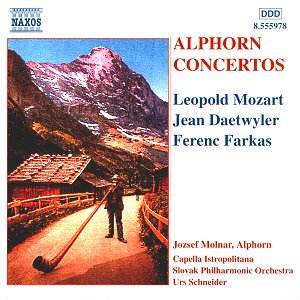This disc is yet another superb transfer from the full-price
Marco Polo label to super-bargain Naxos. While the disc title (Alphorn
Concertos) might suggest it is something of a novelty, the contents,
especially the more substantial pieces by Daetwyler, are anything but.
The booklet immediately states that the instrument is "phenomenal in
size and in its very limited musical range" yet what these three composers,
Daetwyler in particular, do with it is something truly astonishing.
Wolfgang Amadeus's father Leopold Mozart is first up
with a fairly short piece. The first two movements may come across as
slightly subdued to those who know his Toy Symphony but he makes
up for it in the rumbustious finale which is rather forward looking
and is not a million miles removed from one of Mahler's ländler
settings or his Wunderhorn music. It provides a nice lively contrast
to the following Daetwyler piece, although it might make more sense
when playing this disc to programme it so that the Farkas follows next.
Incidentally, the Leopold Mozart piece was actually originally written
for an instrument called the corno pastorito but sounds very
well on alphorn.
My only previous encounter with the music of Farkas
was his suite of Old Hungarian Dances which is a sort of central
European Capriol and this Concertino Rustico is similarly
accessible and listenable, although again very short, with two faster
outer movements framing a central more reflective one, none clocking
in at more than four minutes.
The meat of this collection is undoubtedly contained
in the two pieces by the Swiss composer Jean Daetwyler. Hailing from
the French-speaking region of the country, he studied with d'Indy in
Paris, before returning to Switzerland where he made a speciality of
setting folk music and folk instruments in a classical context. Anyone
who doubts that the alphorn can be used in such a way should hear these
pieces. While very individual pieces in their own right, various other
music did cross my mind when listening to them. For instance, anyone
who knows the sublime central Romance of Vaughan Williams' Tuba
Concerto will know that any instrument can be made to sing, in the
right hands. Similarly, those collecting the Tveitt Naxos series, especially
the Hardanger suites, will find echoes here of that composer. Daetwyler's
music has been accurately described as being "naturalistic and lyrical"
so it will come as no surprise that Delius, Grieg and Mahler, plus perhaps
Daetwyler's compatriot Honegger (especially the folk based fourth symphony
Deliciae Basiliensis) are possible reference points. However,
more than all these, I was constantly reminded of not music but a marvellous
but slim volume of poetry and prose written by Hermann Hesse (Wandering)
which grew from origins very similar to Daetwyler's music and has been
described as a "near pantheist idyll". It also brought back memories
of several happy summers in the early nineties spent walking the peaks
of France's Hautes Alpes.
The Dialogue avec la nature uses the great contrasts
between alphorn and piccolo to describe the interaction between human
and nature in the context of an alpine environment. It is largely reflective
in nature, particularly when the alphorn sings its melancholic song
alone, but has some more lively dance-inspired passages, especially
in the final rondo section.
The slightly longer Concerto is divided into
four movements, the first and third mainly meditative in temperament,
the second and fourth dance based. The extended third movement, which
Daetwyler called "a description of nature, which seems eternal", is
particularly beautiful. As in the Dialogue, woodwind and strings
are used very poetically, but the solo alphorn parts are perhaps the
most distilled. The first dance (Hirtentanz) is exuberant but
slightly off kilter, recalling perhaps one of Prokofiev's or Shostakovich's
ironic waltzes. The closing Totentanz (Dance of Death!) begins
with a bombardment of percussion with the alphorn sounding almost saxophone
like (this reminded me of one of Jan Garbarek's most fruitful pre-Hilliard
collaborations - with improvising Swiss violinist Paul Giger on the
latter's Alpstein CD). This music, despite its title, is in no
way depressing and is informed by Daetwyler's sentiment that "it is
true that men who live close to the land know by instinct that life
can only come from death", echoing the views of yet another kindred
spirit, the great Danish composer Carl Nielsen.
I was pleasantly surprised by this CD and have listened
to it repeatedly, I cannot recommend it highly enough.
Neil Horner


